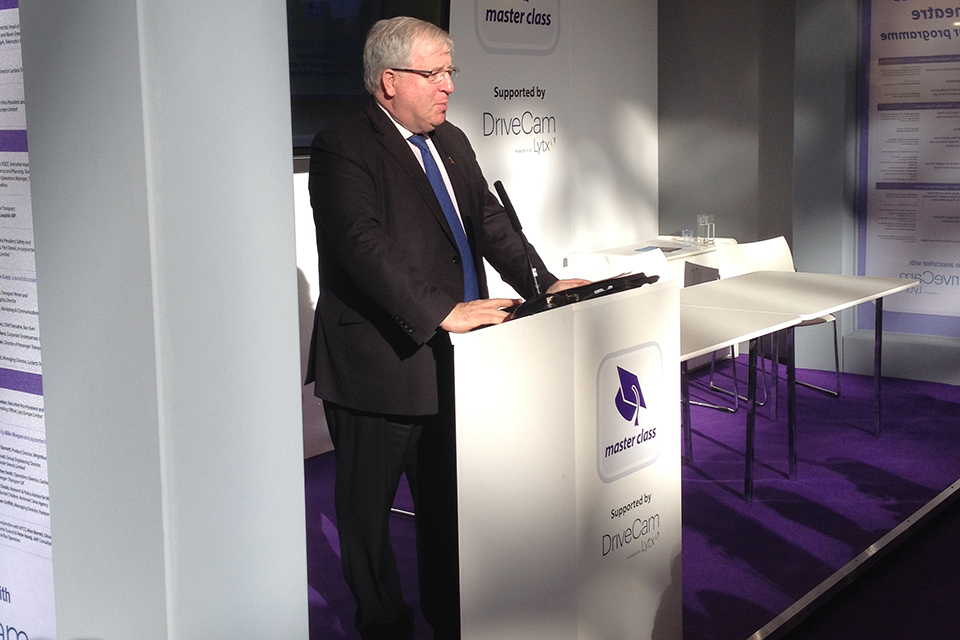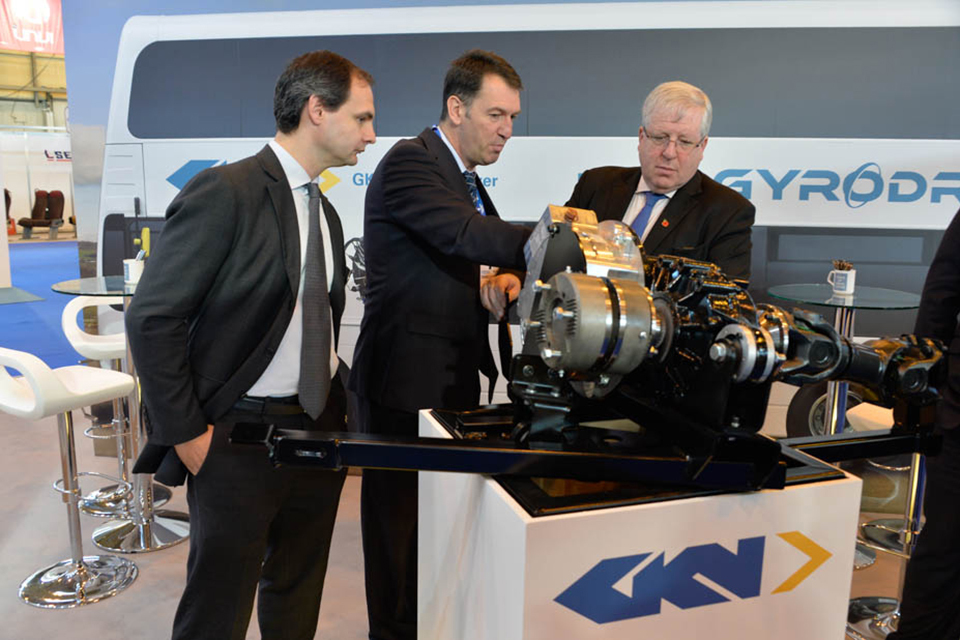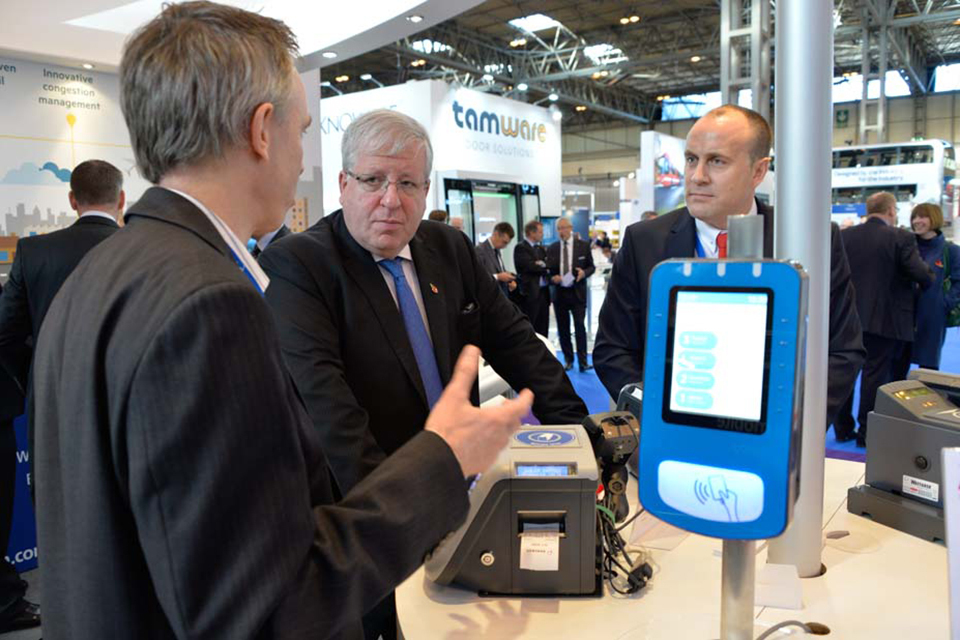The role of buses
Speech at the EuroBus Expo in Birmingham about the important role buses play in the backbone of transport and the economy.

Thank you for that introduction.
It’s a pleasure to be here at Euro Bus Expo 2014. One of the highlights of the bus calendar. And a fantastic advertisement for this industry.
Importance of buses
And what it shows is a confident industry.
One that’s growing. One that’s doing great things.
And one that is the backbone of transport and the economy. You don’t need me to tell you that buses matter. They account for 2 thirds of all public transport journeys. And coaches carry as many people around the country as rail. Together, they clock up around 6 billion passenger journeys a year. They are absolutely critical to the UK. Perhaps we don’t always say that often enough.

Transport Secretary attends Euro Bus Expo 2014.
Role of buses
Buses support jobs. Of which more than one and a half million have been created by this government. For many people, buses may be their only way to get to work. All of which means buses are one of the truly essential public services. And one in which the private sector takes such a strong lead.
Of course, there is room for government to support, too. This year, we will fund nearly £1 billion of spending on Concessionary Travel. More than £300 million has been allocated to fund major bus projects. We have spent £70 million through the better bus areas scheme across 24 local authorities. And many other bus improvement schemes have been supported through our £600 million local sustainable transport fund. And it is that word ‘local’ which counts here.
We’ve seen it this week in Greater Manchester where local leaders came together to back a new elected Mayor who will help join together different forms of transport.
Private sector operators
This is part of a strategy designed to meet the different characteristics of each city or region. But be in no doubt. I back the vital role of the private sector in buses. Bus operators have innovated because they are commercial businesses. Competing against other forms of transport. And against other operators. It’s the private sector – working in tandem with local authorities – that is driving bus growth in many cities.
And providing better, safer, cleaner services for passengers. Just as private sector operators have driven growth and transformed services on the railway. I believe there is a huge amount of common ground between private and public sector on buses. We all want to give customers the best service and see the market grow.
Manufacturing
But buses aren’t just about services. They are about suppliers too. We are fortunate to have many leading bus and coach manufacturers in this country. From Alexander Dennis to Optare. And Wrightbus in Northern Ireland, which builds the new Routemaster.
A regular sight now on London roads. And a real export opportunity in the years ahead. We’re enhancing the competitiveness of UK suppliers. Developing low carbon vehicles further. For example, £59 million investment through the Green Bus Fund has already resulted in 883 new low carbon buses in service in England.
Many of you are waiting with interest for the bidding arrangements for the £30 million bus fund we announced in April as part of the £500 million package of OLEV funding.
I am sure this includes the manufacturers I met a short while ago. The details of the competition are being finalised and will be announced shortly. I hope many of you will take part.
Rural areas
So yes: buses are so important to people in busy towns and cities. But as a resident of rural Derbyshire, I also know just how important they are to people in the countryside. For many isolated communities, buses can be a lifeline. And I know there are challenges - big challenges - here.
The old model of services is changing. We need to make sure that as it changes people retain access to good transport. Sometimes, better, more flexible services not just a token underused one running on market days only. Or good new services that really serve visitors to countryside - and rural people getting to jobs. We will all need to work together to get this right.
I can’t claim to have all the answers. And we need to look beyond the simple question of public funding. Commercial operators will provide services in those areas where there are enough passengers. But where this is not feasible, local authorities have an important role supporting rural bus services.
Just as we must all support the valuable work done by community transport operators in many rural areas. I am a big supporter of their work alongside - not instead of - a thriving private bus market.

Patrick McLoughlin attending the Euro Bus Expo 2014 at the NEC in Birmingham.
Smart technology
There’s another massive opportunity for transforming bus services that every operator should be grasping. And that’s smart ticketing. Frankly, progress on smart, multi-operator, multi-modal ticketing has been patchy at best.
I welcome this week’s announcement about Oyster-style cards between operators. That’s great news and by getting it in place soon the private industry will be showing its worth.
I understand there are technical issues and commercial challenges. But some operators and authorities are demonstrating exactly how it should be done. In August, the SolentGo smart ticket was launched. Covering Southampton, Hampshire, Portsmouth and Isle of Wight.
This is an excellent model of collaboration. In Centro the “Swift” smart ticket scheme has over 3,000 customers. If operators can deliver smart ticketing, as promised, by 2015, this will be a real game changer for the industry and the passenger.
I will hold them to their promises. So will passengers.
Accessibility
There’s other technology that can change too. Like more accessible buses. Latest statistics for September 2014 show that 84% of buses in England now meet the main industry accessibility requirements.
One thing we’d like to see is more audio and visual technology on buses. To help blind and partially sighted passengers. Of course the industry has to be realistic about the cost. But we have no plans to make systems mandatory by changing existing legislation.
Conclusion
So to sum up.
There are challenges facing the industry. There are particular challenges in rural areas. The need for efficient, reliable, affordable, clean bus services is only going to rise. So absorbing demand while increasing passenger satisfaction will be a major objective in the years ahead.
But I’m sure it’s one we will achieve.
According to a recent Passenger Focus survey, bus passengers are increasingly happy with the service they’re getting. With improvements in value for money, punctuality, journey times, and reducing anti-social behaviour.
Overall satisfaction is going up. So you are doing a great job. And for that, I congratulate you.
And thanks for listening.